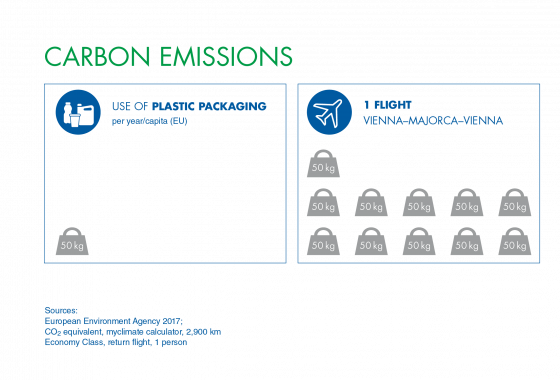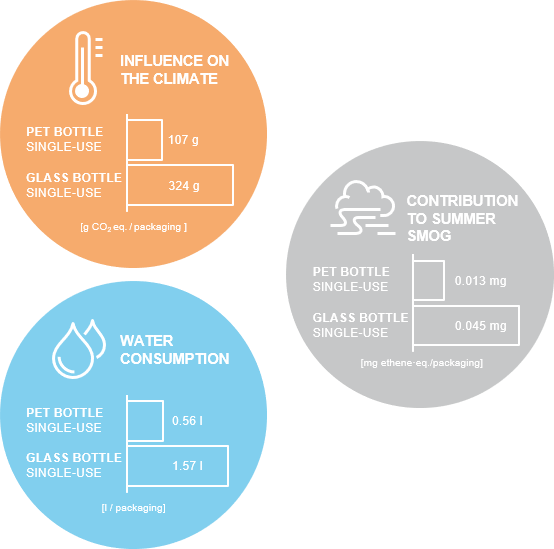Plastics – the true extent of their climate impact
A term that often comes up in relation to global climate targets being achieved is the ‘carbon footprint’. We all cause carbon emissions in our daily lives and through our actions and these contribute to the global greenhouse effect. If we consider these contributions in detail, it becomes apparent that the household use of plastics has only a very small part to play in a person’s carbon footprint.

The average EU citizen causes approximately 8.4 tonnes of carbon emissions a year that contribute to the global greenhouse effect. As apportioning emissions to an individual is highly complex, some studies come to different conclusions with higher emission figures. But there is one thing that can be said for certain: in the majority of developed countries such as Germany, people’s individual carbon emissions have been declining for decades. In this context, there is often a call for the use of plastic packaging to be restricted in order to lower carbon emissions further. But this is a fallacy. Plastic packaging in the households of EU citizens accounts for a mere 0.6 per cent of their carbon footprint. This equates to 50 kilograms a year.

As a comparison, just one return flight from Vienna to Majorca and back causes more than 550 kilograms of carbon emissions per passenger. This equates to a person’s plastic packaging consumption over eleven years.
Alternative materials increase carbon emissions
Reducing the use of plastic packaging would therefore have a vanishingly small effect on the climate. Studies also show that alternative packaging materials that could be used as substitutes for plastic have the opposite effect. These alternatives are primarily metals, glass and paper-based materials. If preference were given to these materials, their weight would be 3.6 times higher than that of the plastics they would replace. It would take more than twice the energy to produce them. Greenhouse gas emissions would increase by a factor of 2.7. Considerably more carbon emissions are therefore caused if plastics are avoided.
Comparison with PET bottle
The correlation is simple. Plastic packaging such as PET beverage bottles is light and it takes much less energy to produce it than glass bottles. Plastic bottles also reduce the energy needed for transportation to the bottler and to the retailer and therefore cause fewer carbon emissions. Plastics such as PET are also highly recyclable, thus further improving their environmental footprint. The climate effect of a 0.5-litre aluminium can is 69 per cent greater than that of a carbonated soft drink bottle of the same size made of recycled PET. The climate effect of a single-use glass bottle is even 342 per cent greater. And even as reusable packaging, a glass bottle performs significantly worse than a bottle made of recycled PET.

The carbon footprint broken down
At approximately a quarter, a person’s private consumption accounts for the largest proportion of their carbon footprint. Other significant factors are heating (18 per cent), food (15 per cent) and passenger vehicle use (14 per cent). Flights account for a further eight per cent on average. In comparison, at 0.6 per cent, the use of packaging in private households is vanishingly small. We all cause carbon emissions with our actions and we can influence the size of our carbon footprint. Depending on the distance, forgoing just one long-haul flight can reduce an EU citizen’s carbon footprint by one to two tonnes. And an aspect which is rarely given a mention in public debate is the fact that use of the Internet causes approximately the same amount of global carbon emissions as air traffic, among other things due to the immense energy consumption of servers.
More exciting factors
Private households in developed countries could improve their carbon footprint by 530 kilograms by switching to electricity from renewable sources. Mathematically speaking, by no longer eating meat, a person can reduce their carbon emission contribution by 450 kilograms. In comparison, frequently touted changes in behaviour such as saving energy in the household and the systematic recycling of waste have only a minimal effect.
(Author: Claudia Wörner, yes or no.)
Do you like our texts? Perhaps even so much that you want to use them in your own media? Then please get in touch with us beforehand!
